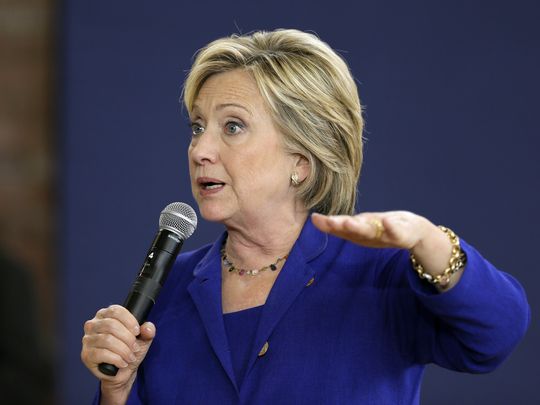WASHINGTON — By the time Democratic presidential front-runner Hillary Clinton announced on Wednesday that she opposed a massive 12-nation trade deal, her major campaign rival, Sen. Bernie Sanders, had been prodding her for months to take a position.
The same was true of Clinton’s statement that she opposed the Keystone XL pipeline. Before she revealed her position last month, Sanders, a Vermont independent also running for the Democratic presidential nomination, had repeatedly asked why she hadn’t come out against the project.
The former secretary of State and Sanders have so far avoided attacking each other. But Sanders, a self-described democratic socialist, hasn’t missed a chance to highlight his policy differences with the more moderate Clinton on progressive priorities and drive the debate in that direction. That approach will likely continue Tuesday during the first Democratic presidential debate on CNN.
“I don’t see us going in there saying, ‘Here’s the five attacks we’re going to launch today,’ ” said Tad Devine, Sanders’ senior media adviser. “For him, if we can have a debate that is very much driven by issues and not kind of ‘gotcha’ questions or political stuff, that would be his preference.”
Sanders has drawn thousands of energetic supporters to his events, surged in polls and raised millions (mostly in small donations) by calling for a “political revolution” focused on fighting income inequality, climate change, “corporate greed” and a campaign finance system that he says allows billionaires to buy elections.
Progressives believe the public’s response to Sanders’ message is reshaping the Democratic presidential debate.
“If it weren’t for Sanders, we wouldn’t know that there’s this level of passion out there in the Democratic base for a bold, progressive vision,” said Ben Wikler is the Washington Director of MoveOn.org, which has not endorsed a candidate. “The electorate is speaking, and Clinton is clearly listening.”
Moderate Democrats, however, worry that the grass-roots energy supporting Sanders’ liberal agenda could force Clinton — and the party’s brand — too far to the left to be competitive in a general election.
“To get elected, (Clinton’s) going to have to be more of the middle — moderate,” said Sen. Joe Manchin, D-W.Va. “I’m hoping that she stays there.”
Matt Bennett, a co-founder of the centrist think tank Third Way, said Wednesday that Clinton has done a good job straddling the two wings of the party. But later that same day, after Clinton announced her opposition to the Trans-Pacific Partnership trade agreement, he said “the jury is now out” on whether he was correct in his earlier statement.
Third Way, named for former president Bill Clinton’s governing philosophy, believes the TPP trade deal will help restore prosperity for middle-class workers.
“(Hillary Clinton) has said that her campaign is all about middle-class prosperity, and we just can’t have middle-class prosperity without a bigger share of the Asian market,” Bennett said. “They might be celebrating this in the Sanders campaign, but this doesn’t have anything to do with Bernie Sanders. The sad fact is that Democrats in primaries campaign as protectionists and then they govern as free traders.”
A Clinton spokesman declined to comment on Sanders' impact on the Democratic presidential debate.
Speaking in Iowa, Clinton said Wednesday she doesn’t believe the trade deal announced Monday meets “the high bar I have set.” When she announced her opposition to the Keystone pipeline on Sept. 22, she said the project would hurt efforts to curb climate change, the same view adopted by the Democratic Party’s left wing.
Sanders said he welcomed both of Clinton’s announcements — and reminded Democratic voters that he had long opposed both the trade deal and the pipeline.
It’s unclear what policy positions Clinton would take without Sanders in the race, but Sanders has been an “incentive” for Clinton to take more liberal stances, said Dante Scala, associate professor of political science at the University of New Hampshire.

“I think (Keystone) was probably an issue on which, if she were in doubt about what to do, the threat of Sanders made it clear politically what she should do,” Scala said. “She didn’t want to give progressive Democrats another reason not to vote for her or another reason to stick with Sanders.”
In July, Sanders capitalized on Clinton’s meeting with the Senate Democratic caucus by holding an impromptu press conference to highlight his “differences of opinion” with Clinton on progressive priorities, from raising the minimum wage to Wall Street reform.
Sanders has proposed breaking up the biggest banks and reinstating Glass-Steagall financial regulations that separated commercial and investment banking activities. Clinton, whose husband signed legislation repealing Glass-Steagall, says her “more comprehensive approach” will rein in large financial institutions and address risk.
Clinton, who has been criticized by the left for her corporate ties, is walking “a tightrope” in trying to prove she’ll be tough — but not too tough — on Wall Street, said Charles Chamberlain, executive director of Democracy for America. He noted that it took a while for her to endorse legislation in August that seeks to make it more difficult for government workers to immediately take lucrative Wall Street jobs after leaving the public sector.
“I’m confident that Secretary Clinton would not have signed onto that bill if it hadn’t been for a contested primary challenge by Sen. Sanders,” Chamberlain said.
Chamberlain said he also sees Sanders’ influence in Clinton’s plan to punish gun manufacturers when their firearms are used to commit crimes. Sanders, who hails from a gun-friendly state, voted in favor of limiting gun makers’ liability in such cases.
“She sees a place where she can stake out a position that she feels is further to the left of Sanders,” Chamberlain said. “That’s proof of a contested primary.”
- Publish my comments...
- 0 Comments
